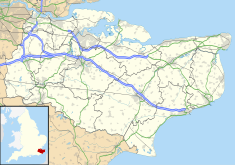Draft:Astor Theatre, Deal
| Submission declined on 8 October 2024 by KylieTastic (talk). This submission is not adequately supported by reliable sources. Reliable sources are required so that information can be verified. If you need help with referencing, please see Referencing for beginners and Citing sources. This draft's references do not show that the subject qualifies for a Wikipedia article. In summary, the draft needs multiple published sources that are:
Where to get help
How to improve a draft
You can also browse Wikipedia:Featured articles and Wikipedia:Good articles to find examples of Wikipedia's best writing on topics similar to your proposed article. Improving your odds of a speedy review To improve your odds of a faster review, tag your draft with relevant WikiProject tags using the button below. This will let reviewers know a new draft has been submitted in their area of interest. For instance, if you wrote about a female astronomer, you would want to add the Biography, Astronomy, and Women scientists tags. Editor resources
|  |
 Comment: The body of this draft is in five sections. Three are unreferenced, giving the reader no reason to believe what's written. But let's look at how the other two end: It quickly became a central cultural hub for the town of Deal, fostering creativity and community spirit. And It remains a vital part of Deal's cultural landscape, celebrated for its contributions to the town’s artistic and social life. Really? Who says so, and where do they say it?NB I'm not saying it's not true. I am just saying that readers should not be expected to believe it merely because somebody wrote it for Wikipedia. Instead, they're entitled to references to reliable sources, of course independent of the Astor Theatre, for such value-judgments. Hoary (talk) 09:12, 9 October 2024 (UTC)
Comment: The body of this draft is in five sections. Three are unreferenced, giving the reader no reason to believe what's written. But let's look at how the other two end: It quickly became a central cultural hub for the town of Deal, fostering creativity and community spirit. And It remains a vital part of Deal's cultural landscape, celebrated for its contributions to the town’s artistic and social life. Really? Who says so, and where do they say it?NB I'm not saying it's not true. I am just saying that readers should not be expected to believe it merely because somebody wrote it for Wikipedia. Instead, they're entitled to references to reliable sources, of course independent of the Astor Theatre, for such value-judgments. Hoary (talk) 09:12, 9 October 2024 (UTC)
This article needs additional citations for verification. (October 2024) |
| This is a draft article. It is a work in progress open to editing by anyone. Please ensure core content policies are met before publishing it as a live Wikipedia article. Find sources: Google (books · news · scholar · free images · WP refs) · FENS · JSTOR · TWL Last edited by Hoary (talk | contribs) 2 months ago. (Update)
Finished drafting? or |
| The Astor Theatre | |
|---|---|
| Location | Stanhope Road, Deal |
| Coordinates | 51°13′30″N 1°23′56″E / 51.2249°N 1.399°E |
| Built | 1906 |
| Architectural style(s) | Gothic Revival style |
| Website | theastor |
The Astor Theatre is a multi-purpose arts centre located in Deal, a seaside town on the East Kent coast, near Canterbury, Dover, and Sandwich.
Early history
[edit]The land on which the Astor Theatre stands was once owned by the Iggulden brothers, prominent local figures in the 18th and 19th centuries. The brothers, who were frequently mayors of Deal and involved in the shipping and brewing industries, established Hills Brewery on the site. In 1901, the brewery was sold to Thompson & Sons Brewery, which subsequently closed it. The land was then purchased by Steed Bayley and Arthur Wise for redevelopment.
Stanhope Hall and early usage
[edit]Stanhope Road, where the theatre is located, first appeared in Deal’s street directory in 1906, along with a terrace of houses and a General Post Office. In December of the same year, Stanhope Hall opened its doors, initially serving as a venue for community celebrations and meetings. It hosted a range of events, including concerts and shows, especially during bad weather when the Pier Theatre was unavailable. The hall also briefly operated as a roller-skating rink and, in 1921, was renamed the Winter Gardens Theatre. A refurbishment took place in 1928, further enhancing the venue’s facilities.
Founding
[edit]In the mid-20th century, the site was leased by Deal Borough Council to Major John Jacob Astor, Member of Parliament. During World War II, it functioned as the Astor Hall/Winter Gardens and included a Women's Voluntary Services (WVS) canteen. In 1944, Major Astor gifted the site to the people of Deal as a gesture of appreciation for their resilience during the war. The building was renamed The Astor Theatre.
Campaign for preservation and restoration
[edit]Following years of underuse, public pressure mounted to preserve the theatre and its historical significance. In 2000, a dedicated campaign to save the theatre began. In June 2009, James Tillitt, representing Deal Arts Management CIC, acquired the lease and initiated a seven-month restoration project. The theatre reopened in January 2010[1], originally under the name The Astor Community Theatre. It quickly became a central cultural hub for the town of Deal, fostering creativity and community spirit.
Recent developments
[edit]Since the departure of James Tillitt in 2021, and despite the challenges posed by the COVID-19 pandemic, the Astor Theatre[2] has continued to thrive. It remains a vital part of Deal's cultural landscape, celebrated for its contributions to the town’s artistic and social life.
References
[edit]- ^ "Kent theatre to start producing panto for first time since 2010 reopening". The Stage. Retrieved 8 October 2024.
- ^ "Deal: Community theatre faces £20,000 shortfall". BBC News. 30 April 2024. Retrieved 8 October 2024.
External links
[edit]

